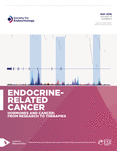Postmenopausal serum androgens, oestrogens and breast cancer risk: the European prospective investigation into cancer and nutrition
- R Kaaks1,
- S Rinaldi1,
- T J Key2,
- F Berrino3,
- P H M Peeters4,
- C Biessy1,
- L Dossus1,
- A Lukanova1,5,
- S Bingham6,
- K-T Khaw7,
- N E Allen2,
- H B Bueno-de-Mesquita8,
- C H van Gils4,
- D Grobbee4,
- H Boeing9,
- P H Lahmann9,
- G Nagel10,
- J Chang-Claude10,
- F Clavel-Chapelon11,
- A Fournier11,
- A Thiébaut11,
- C A González12,
- J R Quirós13,
- M-J Tormo14,
- E Ardanaz1,5,
- P Amiano16,
- V Krogh3,
- D Palli17,
- S Panico18,
- R Tumino19,
- P Vineis20,21,
- A Trichopoulou22,
- V Kalapothaki22,
- D Trichopoulos22,
- P Ferrari1,
- T Norat1,
- R Saracci1 and
- E Riboli1
- 1International Agency for Research on Cancer (IARC-WHO), 150 cours Albert-Thomas, 69372 Lyon cedex 08, France
- 2Epidemiology Unit, Cancer Research UK, University of Oxford, Oxford, UK
- 3National Cancer Institute, Milan, Italy
- 4Julius Center for Health Sciences and Primary Care, University Medical Center, Utrecht, The Netherlands
- 5New York University School of Medicine, New York, USA
- 6MRC Dunn Human Nutrition Unit, Welcome Trust/MRC Building, Cambridge, UK
- 7Clinical Gerontology Unit, Addenbrooke’s Hospital, Cambridge, UK
- 8Centre for Nutrition and Health, National Institute for Public Health and the Environment, Bilthoven, The Netherlands
- 9Department of Epidemiology, German Institute of Human Nutrition, Potsdam-Rehbrücke, Germany
- 10Division of Clinical Epidemiology, German Cancer Research Center, Heidelberg, Germany
- 11INSERM, Institut Gustave Roussy, Villejuif, France
- 12Department of Epidemiology, Catalan Institute of Oncology, Barcelona, Spain
- 13Sección Información Sanitaria, Consejería de Salud y Servicios Sanitarios de Asturias, Asturias, Spain
- 14Epidemiology Department, Murcia Health Council, Murcia, Spain
- 15Public Health Institute of Navarre, Navarre, Spain
- 16Public Health Division of Gipuzkoa, Health Department of the Basque Country, Donostia-San Sebastian, Spain
- 17Molecular and Nutritional Epidemiology Unit, CSPO, Scientific Institute of Tuscany, Florence, Italy
- 18Department of Clinical and Experimental Medicine, Federico II University, Naples, Italy
- 19Cancer Registry, Azienda Ospedaliera ‘Civile M.P. Arezzo’, Ragusa, Italy
- 20University of Turin, Turin, Italy
- 21Imperial College of Science, Technology and Medicine, London, UK
- 22University of Athens Medical School, Athens, Greece
- (Requests for offprints should be addressed to R Kaaks; Email: kaaks{at}iarc.fr)
Abstract
Considerable experimental and epidemiological evidence suggests that elevated endogenous sex steroids — notably androgens and oestrogens — promote breast tumour development. In spite of this evidence, postmenopausal androgen replacement therapy with dehydroepiandrosterone (DHEA) or testosterone has been advocated for the prevention of osteoporosis and improved sexual well-being. We have conducted a case–control study nested within the European Prospective Investigation into Cancer and Nutrition. Levels of DHEA sulphate (DHEAS), (Δ4-androstenedione), testosterone, oestrone, oestradiol and sex-hormone binding globulin (SHBG) were measured in prediagnostic serum samples of 677 postmenopausal women who subsequently developed breast cancer and 1309 matched control subjects. Levels of free testosterone and free oestradiol were calculated from absolute concentrations of testosterone, oestradiol and SHBG. Logistic regression models were used to estimate relative risks of breast cancer by quintiles of hormone concentrations. For all sex steroids –the androgens as well as the oestrogens – elevated serum levels were positively associated with breast cancer risk, while SHBG levels were inversely related to risk. For the androgens, relative risk estimates (95% confidence intervals) between the top and bottom quintiles of the exposure distribution were: DHEAS 1.69 (1.23–2.33), androstenedione 1.94 (1.40–2.69), testosterone 1.85 (1.33–2.57) and free testosterone 2.50 (1.76–3.55). For the oestrogens, relative risk estimates were: oestrone 2.07 (1.42–3.02), oestradiol 2.28 (1.61–3.23) and free oestradiol (odds ratios 2.13 (1.52–2.98)). Adjustments for body mass index or other potential confounding factors did not substantially alter any of these relative risk estimates. Our results have shown that, among postmenopausal women, not only elevated serum oestrogens but also serum androgens are associated with increased breast cancer risk. Since DHEAS and androstenedione are largely of adrenal origin in postmenopausal women, our results indicated that elevated adrenal androgen synthesis is a risk factor for breast cancer. The results from this study caution against the use of DHEA(S), or other androgens, for postmenopausal androgen replacement therapy.
- © 2005 Society for Endocrinology














